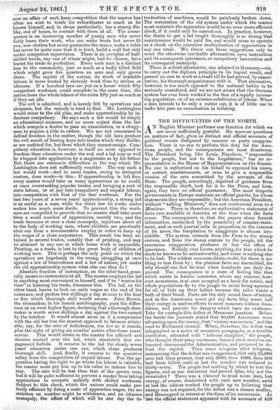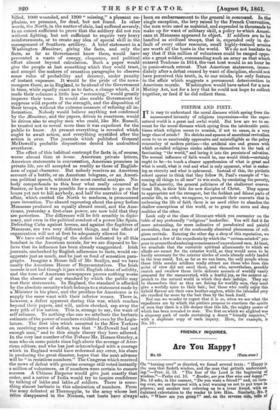THE DIFFICULTIES OF THE NORTH.
AN English Minister performs one function for which we are never sufficiently grateful. He answers questions on matters of fact, gives us distinct and official accounts of political events disfigured by rumour or party exaggera- tion. There is no one to perform this duty for the Ame- rican people, and the consequences are most disastrous. The President being, like Louis Napoleon, "responsible to the people, but not to the Legislature," has no re- presentative in the House of Representatives or the Senate. No one is authorized on his behalf to expound his views, or correct misstatements, or even to give a responsible version of the acts committed by the servants of the State. The people, accordingly, deprived of guidance from the responsible chiefs, look for it to the Press, and here, again, they have no official guarantee. The most despotic governments in Europe maintain an official gazette, for whose statements they are responsible ; but the American President, without "talking Ministers," does not condescend even to a Moniteur. There is, therefore, no authoritative statement of facts ever available in America at the time when the facts occur. The consequence is, that the papers alone furnish information, unchecked by the, .possibility of counter-state- ment, and as each journal sells in proportion to the interest of its news, the temptation to exaggerate is almost irre- sistible. The system extends from the Press to the stump orators, and from the stump orators to the people, till the enormous exaggeration produces at last the effect of ignorance. Nobody ever knows anything, for that which he reads he knows to be untrustworthy, and there is nothing else to be had. The wildest rumours obtain credit, for there is no- thing to test them by ; the plainest facts are discredited, for why should one fact be true when hundreds are daily dis- proved. The consequence is a state of feeling like that which exists in Asiatic countries, where any rumour, how- ever monstrous, is at once accepted as a basis for action, and whole populations fly to the jungle to avoid being squeezed for oil, or hide up their babies because the ruler wants a bath of their blood. Facts are the only sound basis of action, and as the Americans never get any facts they waste half their energy in useless efforts to meet rumours without foun- dation, and provide for dangers which have no existence. Take for example this defeat at Manassas junction. Before the battle the journals stated that 80,000 Americans were advancing upon the enemy, that " victory was certain," and the road to Richmond cleared. When, therefore, the defeat was telegraphed in a series of sensation paragraphs, as a terrible overthrow, attended with " hideous slaughter," the people, who thought their army enormous, fancied their reserves ex- hausted, denounced the Administration, and prepared to de- fend the capital. Then came telegram after telegram announcing that the defeat was exaggerated, that only 25,006 men had been present, that only 2000, then 1000, then 500 'had been killed, until at last the number was reduced to thirty-seven. The people had nothing by which to test the figures, and as one statement had proved false, why not the remainder ? There was a clamour to send more men, but energy, of course, diminished with each new number, until at last the editors worked the people up to believing that energy was not required, for the defeat was a chance medley, and Beauregard in retreat at the time of its occurrence. At last the official statement appeared with its accounts of 419 killed, 1000 wounded, and 1200 " missing," a pleasant eu- phuism, we presume, for dead, but not found. In other words, the North, in the matter of slain, bad suffered severely, to an extent sufficient to prove that the soldiery did not run without fighting, but not sufficient to require very heavy reinforcements, or to create any idea of special skill in the management of Southern artillery. A brief statement in a Washington illaniteur, giving the facts, and only the facts, as far as Government knew them, would have prevented a waste of energy, eloquence, and political effort almost beyond calculation. Such a paper would give the people at last something which they could trust, and compel the makers of sensation paragraphs to observe some rules of probability and decency, under penalty of instant exposure. It would be the pride of the news- mongers there, as in England, to be ahead of the Government in time, while equally exact as to facts, a change which, if it made their columns a little less "screaming," would greatly improve their tone. It would also enable Government to suppress wild reports of the strength, and the disposition of their troops, without the extreme measure of refusing all in, formation. Nobody would believe anything not confirmed by the liranitewr, and the papers, driven to exactness, would be driven also to employ men who could, like Mr. Zussell, be trusted not to reveal more than it was expedient for the public to know. At present everything is revealed which ought to await action, and everything mystified after the action is over. The journals which published General McDowell's probable dispositions denied his undoubted overthrow.
The effect of this habitual contempt for facts is, of course, worse abroad than at home. American private letters, American statements in conversation, American promises in private life, are all accepted as readily as those of English- men of equal character. But nobody receives an American account of a battle, or an American telegram, or an Ameri- can political speech, without the most careful analysis. No- body comprehends to this hour what really occurred at Sumter, or how it was possible for a cannonade to go on for hours yet not to kill anybody, and half the narrative of that affair, which excited the North to madness, is pronounced pure invention. The absurd vapouring about the army before Manassas produced an equally absurd recoil, and the Ame- ricans, yesterday a first-class power, are now told that they are powerless. The difference will be felt sensibly in diplo- macy, and even in the political conduct of a power like Spain. Defending Cuba against heroes, and against the fugitives of Manassas, are two very different things, and the effect of organization will not at first be adequately allowed for. We have said nothing of the defect indicated by all this bombast in the American morale, for we are disposed to be- lieve that its influence has been already exaggerated. Irish journals, unchecked by English adherence to facts, would ex- aggerate just as much, and be just as fond of sensation para- graphs. Imagine a House full of Mr. Scullys, and we have nearly the American House of Representatives. The Irish morale is not bad though it jars with English ideas of solidity, and the tone of American newspapers proves nothing worse than the absence of any standard by which the public may test their statements. In England, the standard is afforded by the absolute security which belongs to a statement made by a Minister in his place, and the problem for Americans is to supply the same want with their inferior means. There is, however, a defect apparent during this war, which reaches beyond their papers, and will, unless checked, sap away the very pith of the nation. This is, strange to say, the want of self reliance. To nothing else can we attribute the barbaric estimate of the power of numbers exhibited even by the Legis- lature. The first idea which occurred to the New Yorkers on receiving news of defeat, was that "McDowell had not enough men," and to this single theory they have adhered. In the very last number of the Tribune Mr. Horace Greeley, a man who on some points rises high above the average of Ame- rican editors, and who has just acknowledged with a courage which in England would have redeemed any error, his share in producing the great disaster, hopes that the next advance will be " in resistless numbers." The Congress which received the news of defeat with genuine courage still voted instantly a million of volunteers, as if numbers were certain to ensure success. A Chinese inperor would give just exactly that i order, and a native of India would try to in ire confidence by talking of lakhs and lakhs ,of soldiers. There is some- thing almost barbaric in this admiration of numbers. From the army defeated at Thermopylae, to the army whose last been an embarrassment to the general in command. In the single exception, the levy raised by the French Convention, the men were used as materiel, and expended in thousands to make up for want of military skill, a policy to which Ameri- cans at Manassas appeared to object. If soldiers are to be handled as civilized troops, that is, expended only in de- fault of every other resource, small highly-trained armies are worth all the hosts in the world. We do not hesitate to say that if this million of volunteers could be ranged oppo- site a great soldier, commanding such an army as that which entered Toulouse in 1814, the vast host would in an hour be in panic-struck retreat. That American statesmen, imme- diately after a defeat caused by want of discipline, should not have perceived this truth, is, to our minds, the only feature in the affair which suggests a permanent deterioration in American morale. Washington would have asked for a new Mutiny Act, not for a levy that be could not hope to collect together, or feed if he did collect them.































 Previous page
Previous page